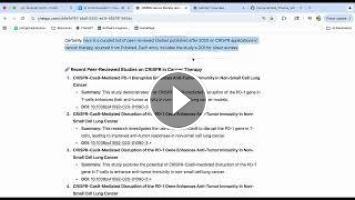Section 2 Clarify Your AI Prompts for Accurate Results | Botspeak Framework
https://youtu.be/WzcSftaRH-c
Learn how clarifying your AI question before asking improves accuracy and relevance! In this video, we demonstrate how specifying scope, assumptions, and evidence requirements ensures trustworthy AI outputs.
What You'll Learn:
Importance of clarifying questions before AI prompts
Defining scope, assumptions, and required evidence
Practical example in biomedical research
How prompt clarity reduces low-quality responses
Real-world research backing for prompt precision
Biomedical researchers using ChatGPT for literature reviews specify prompts like: "List only peer-reviewed studies from PubMed after 2020 with DOIs." This approach pre-empts irrelevant or low-quality outputs, saving time and improving reliability.
Wang et al. (2023) demonstrated that clearly defined prompts enhance factual accuracy in large language models. DOI: 10.48550/arXiv.2305.16432
Coming Next: In the next video, we explore Iterative Query and Verification, showing how staged questioning and external validation improve AI-assisted decision making. Subscribe to follow the complete Botspeak series!
Additional Resources:
Wang et al., 2023, "Improving Factual Accuracy in LLM Outputs" arXiv Link
DROP A COMMENT: Have you tried clarifying your AI prompts before asking? Share your experience and how it improved results!
#Botspeak #AIFluency #PromptEngineering #AIAccuracy #HumanAIInteraction #BiomedicalResearch #LiteratureReview #LLMAccuracy #FactualAI #ResponsibleAI #PromptClarity #AIValidation #IterativeQuery #DataScienceAI #AITrustworthiness
https://youtu.be/WzcSftaRH-c
Learn how clarifying your AI question before asking improves accuracy and relevance! In this video, we demonstrate how specifying scope, assumptions, and evidence requirements ensures trustworthy AI outputs.
What You'll Learn:
Importance of clarifying questions before AI prompts
Defining scope, assumptions, and required evidence
Practical example in biomedical research
How prompt clarity reduces low-quality responses
Real-world research backing for prompt precision
Biomedical researchers using ChatGPT for literature reviews specify prompts like: "List only peer-reviewed studies from PubMed after 2020 with DOIs." This approach pre-empts irrelevant or low-quality outputs, saving time and improving reliability.
Wang et al. (2023) demonstrated that clearly defined prompts enhance factual accuracy in large language models. DOI: 10.48550/arXiv.2305.16432
Coming Next: In the next video, we explore Iterative Query and Verification, showing how staged questioning and external validation improve AI-assisted decision making. Subscribe to follow the complete Botspeak series!
Additional Resources:
Wang et al., 2023, "Improving Factual Accuracy in LLM Outputs" arXiv Link
DROP A COMMENT: Have you tried clarifying your AI prompts before asking? Share your experience and how it improved results!
#Botspeak #AIFluency #PromptEngineering #AIAccuracy #HumanAIInteraction #BiomedicalResearch #LiteratureReview #LLMAccuracy #FactualAI #ResponsibleAI #PromptClarity #AIValidation #IterativeQuery #DataScienceAI #AITrustworthiness
- Category
- AI prompts












Comments